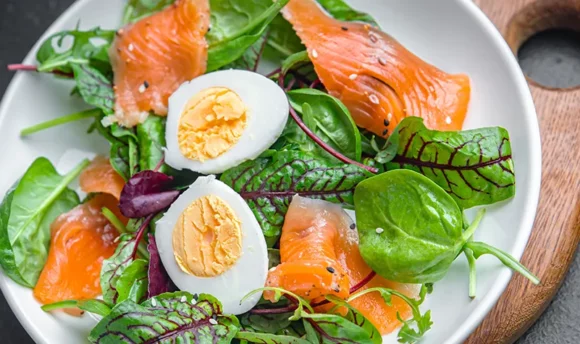How to Stay in Ketosis: 5 Proven Ways
Staying in ketosis might be as challenging as reaching it. How to stay in ketosis effortlessly?

Jumping into the keto lifestyle is both daunting and exciting. The health benefits alone are a big reason to take the plunge into keto, not to mention the weight loss benefits.
But getting into ketosis and staying in ketosis can sometimes be tricky, especially for people who are new to the diet.
Don’t worry. Our keto experts have all of the answers on how to stay in ketosis and get the most out of your keto diet.
5 Tips on How to Stay in Ketosis
The basis of a keto diet involves putting your body into a process called ketosis. Usually, our bodies use carbohydrates to produce energy. However, a keto diet is a low-carb diet, which means your body needs to burn something else for energy.
This is where ketosis comes in. In the absence of enough carbohydrates, our bodies start burning fat stores, which create ketones that our bodies then use for energy. The diet itself is a great way to burn fat and keep your energy levels up. But how do you stay in ketosis?
#1 Keep your carb intake low
The basis of a ketogenic diet is low carbs, so make sure your carb intake is low. In order to maintain ketosis, you want to make sure that your carb intake is anywhere between 20 to 50 grams of carbs per day.
#2 Eat healthy fats
Because a ketogenic diet is a low-carb and high-fat diet, you want to make sure you’re eating the right amount of healthy fats in order to keep your body in a state of ketosis. Make sure your diet has a lot of high-fat meats like beef and seafood, as well as high-fat veggies like avocados.
#3 Up your exercise when you eat carbs
If, for some reason, you’re unable to keep your carb intake low for a few days in a row, make sure you up your exercise during that time. Increased exercise will help you burn off your excess carbs. Consider only eating carb-heavy meals right before you exercise.
#4 Routine exercise
In addition to exercising more when you eat a carb-heavy meal, you want to make sure that your body has a healthy exercise routine. When your body is in ketosis, it’s making a lot of energy. You’ll want to have someplace to put all that energy, and exercise is a great and healthy outlet.
#5 Try intermittent fasting
Incorporating a small amount of intermittent fasting in your daily eating schedule might actually benefit you and keep you in ketosis for longer. When you have a short fast, you’re giving your body enough time to process the carbs that you’ve eaten during the day.
I’m in Ketosis. Now What?
Now that your body is in ketosis and you have some tips to keep yourself there, it’s time to sit back and enjoy all of the new benefits of your ketogenic diet.
Once you’re in a state of ketosis, you’ll notice that you don’t have those dips of energy in the mid-afternoon anymore. You’ll have more consistent energy throughout the day that lasts for all the time you need it since you’re not eating as much sugar, which causes spikes in blood sugar levels.
One of the most noticeable benefits of ketosis is weight loss. When you’re in ketosis, your body will burn stored fat and promote weight loss. You’ll notice that you’re both losing physical weight as well as losing inches around your body.
A lot of food that causes indigestion and heartburn gets cut out of your diet when you’re on keto. Sugary foods, potatoes, and tomatoes, as well as a lot of grain-based foods, will no longer be a part of your diet, which will improve your digestive system.
There are plenty of studies that show that there are a lot of benefits of a high-fat diet when it comes to cognitive function. Now that you’re in ketosis, you’ll probably notice that you have a better time staying focused throughout the day.
According to studies, it is safe to stay in ketosis for about 6 months.
Why Can’t I Stay in Ketosis? 4 Common Reasons
Are you struggling to get into ketosis and stay there? You might be making some rookie keto mistakes. Here are some of the reasons you’re struggling to actually stay in ketosis.
#1 Too many carbs
Your carb consumption might be too high. While the recommended grams of carbs per day should be around 50 grams, you might need to adjust lower depending on your lifestyle. If you’re not burning enough carbs during the day, you might need to have a lower carbohydrate intake.
#2 Uneven macros
Fat, protein, and carbs are known as the macros in your diet. If you’re not tracking your macros properly, you’re going to have a harder time staying in ketosis. You want to have a moderate-protein, low-carbohydrate, and high-fat intake.
#3 Not enough exercise
A ketogenic diet benefits greatly from having a healthy and regular exercise routine. If you’re not exercising enough, your body may not be producing the right amount of ketones to encourage ketosis. It’s shown that exercise helps increase ketone levels.
#4 Limited healthy fats
If you’re not getting enough healthy fats in your diet, then your body is going to have a hard time staying in ketosis. Healthy fats should be about 75% of your daily calorie intake. You also want to make sure that you’re choosing very high-quality fat sources.
How Do You Put Your Body in Ketosis?
Getting into ketosis can take anywhere from 1 to 4 weeks. You want to make sure that you’re following a strict ketogenic diet while trying to enter into ketosis. Here are some tips from keto experts on how to get your body into ketosis, to begin with.
Always talk to your doctor before fasting. Fasting can help your body get rid of all the excess carbs before you start your new diet, which will make it easier for your ketone production.
If you’re still struggling with ketosis, you might find a ketone supplement helpful as well. There are plenty of ketone supplements on the market that will help your body get into ketosis faster.
Something like BHB Ketone Boost Supplements is an all-natural, gluten-free, vegan supplement that boosts energy, decreases appetite, and encourages an easy transition into ketosis.
If you’re a sedentary person or only exercise a few times a week, you’ll want to ramp up your exercise regimen. Exercise helps boost your ketone levels and get rid of any excess carbohydrates. When you’re trying to get into ketosis, it’s definitely helpful to add a few more workout routines into the mix.
A Word From Nutritionist
If you’re looking to dive into the lifestyle, then you’ll definitely want to talk to your doctor before making any commitments. They’ll be able to help you start a new healthy diet that will easily help you get into ketosis.
Nutritional ketosis has a variety of health benefits, including weight loss, more energy, better brain focus, and improved digestion. With burned fat stores as your body’s new primary energy source, you’ll find that you’re going to be losing fat fast.
But getting into ketosis and staying in ketosis is where many people struggle. You can eat keto-friendly foods, but that won’t always guarantee that you’ll enter ketosis. If you’re having issues getting into ketosis and staying there, make sure you try the above-mentioned tips and tricks.
And, of course, if all else fails, make sure you consult your doctor. There may be an underlying reason why your body is having trouble maintaining ketosis. If your main goal is to lose weight, then your doctor might be able to help you pick a more suitable diet for your lifestyle.
Conclusion
Staying in ketosis can sometimes feel like a balancing act. How to stay in ketosis for a long time? The best way is to keep your carb count low, make sure you’re getting enough fat, and maintain your protein intake. You also want to make sure you’re getting enough exercise.
If you’re struggling to stay in ketosis after getting there, you might need to up your healthy fat intake, lower your carb intake, and exercise more. Staying in ketosis requires a lot of patience and dedication. A strict diet and exercise routine will help you stay on track.
A short fast might also benefit your state of ketosis. Fasting intermittently throughout the day can help your body burn the carbs you’re eating. Make sure you keep track of your macros and your daily fat intake.

















































 Select your language:
Select your language: 








